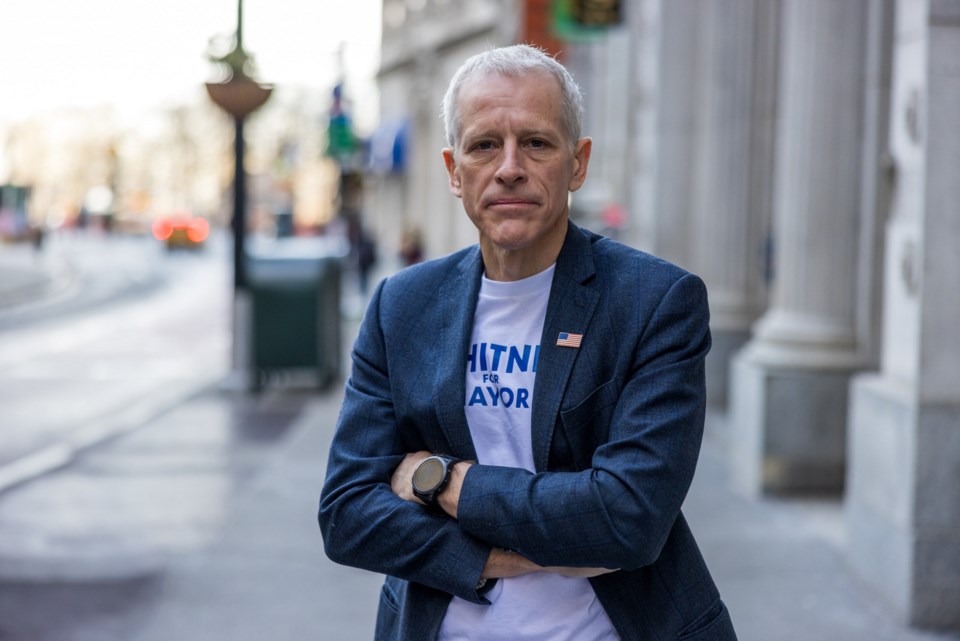There are 12 Democrats running for New York City mayor this election. Among them is Whitney Tilson, an investor, nonprofit founder and education reform advocate who describes himself as a "pro-business Democrat."
"I want to be the mayor of entrepreneurship and fostering investment," Tilson said. "Too often, I find the rhetoric in the Democratic Party is just sort of demonizing, making money, building wealth, etc., and we shouldn't be."
Tilson was born in New Haven, Conn., to teacher parents who met while serving in the Peace Corps. He spent much of his childhood abroad in Tanzania and Nicaragua, later returning to the U.S. to live in California, Western Massachusetts and Boston. He graduated from Harvard College in 1989 and earned his MBA from Harvard Business School in 1994. In between, he co-founded the international education nonprofit Teach For All with CEO Wendy Kopp.
After business school, Tilson settled in New York City’s Upper East Side with his wife and three daughters. He went on to found Inner City Ventures Partners, which invests in minority- and women-owned businesses (MWBEs) and later ran the hedge fund Kase Capital Management. He also served on the board of the KIPP charter school network for over two decades, before resigning to run for mayor.
It was Tilson’s work with KIPP that launched his political activism. A longtime Democrat, he became disillusioned when he felt the party began opposing charter schools.
"I couldn't understand," Tilson said. "Isn't the Democratic Party supposed to be fighting for low-income minority kids and giving them a fair shot in life through a good education?"
That experience led him to co-found Democrat for Education Reform in 2007. If elected, he says he will push to hold public schools to the same accountability standards as charter schools.
"Charter schools are rigorously evaluated," he explained. "[If] schools aren't delivering for kids, they will get put on probation or shut down. My question is, why aren't the public schools held to the same standards of accountability?"
Tilson supports phonics-based reading programs, ending social promotion, and opening more specialized high schools like Brooklyn Tech and Stuyvesant to expand opportunities for students.
On the campaign trail, he says voters are most concerned about affordable housing, crime, and homelessness. He advocates for zoning reforms, citing cities like Austin and Minneapolis that have successfully encouraged more construction.
"Austin has finished the marathon," Tilson said. "We still have a much more acute crisis in this city, and we're still tying our shoes. We need to act with the urgency that it is because people, particularly working-class families, are getting priced out of the city."
On public safety, Tilson credits Mayor Eric Adams’ recent progress in reducing crime to the leadership of NYPD Commissioner Jessica Tisch, whom he plans to retain. On homelessness, he calls for more supportive housing, additional shelter beds, and expanded access to psychiatric care.
"We probably need 10% more homeless shelter beds and drop-in center beds to get the street homeless off the streets," he said. "We need at least a couple thousand more long-term psychiatric beds, because some of these people, they will never be able to live independently."
Though he doesn’t support raising taxes on the wealthy, Tilson believes the city can increase revenue through economic growth. “From big businesses to small businesses,” he says, prosperity should be the city’s focus.
Tilson, a political outsider, acknowledges he is not a frontrunner, but believes voters may be ready for someone different.
"If you are fed up," he said, "[and] think and want real change and recognize that yet another career politician elected to, elected by and largely beholden to all the special interests in this city, that that person isn't likely to be a real change agent. If you want an outsider who won't owe anything to anyone, and who has a business background, who can manage this city a lot better, then I'm your guy."




